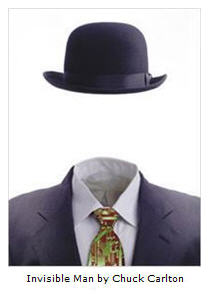Giving shape to invisibility.
 I plucked those evocative words from a writer I’ve recently discovered, Wolf Pascoe at Just Add Father, and the reference comes from this:
I plucked those evocative words from a writer I’ve recently discovered, Wolf Pascoe at Just Add Father, and the reference comes from this:
When I was eight, my father died suddenly. My mother never remarried. As a result, a good part of my life has been defined by what was missing. The heavy lifting for me has always involved giving a shape to an invisibility.
Do we ever effectively discard the legacies of absence?
I did not know the loss of a parent during childhood, thankfully. But there are other legacies; I carry the history of a mother’s love that was peppered with rage, and the absent father who remained distant until the light of my adulthood.
The invisible man, the invisible woman
When marriages end, parenting may wither for a time, or in permanence. When partnerships are problematic, some take refuge by walking away emotionally, or worse, through active dismissal or manipulation. These adults are not always easy to peg; they may never know the void created of their ambivalent presence, or the failure to thrive that results from benign neglect.
Those who observe the children, those who are the children, feel that something is missing. They may seek to name it, seek to change it, all the while tramping through their own dark times.
Role models
For my sons, I worry over what I could not furnish: the schooling that comes from the constancy of a good male presence, the most honorable secrets of their sex, the ways to love and relate in the manner of men – I would hope – fully and fairly.
In this, the words I cite above resonate.
For my sons, I know there have been no tragedies. I am grateful they’ve known laughter, attentiveness, discipline, encouragement, and adventure along with their share of struggles. Still, I have only my soundings, my intuition, and my interpretations through a personal lens to gauge their growth and their sense of security.
And again the words resonate: I have tried to shape a partial invisibility, with whatever kindness I could manufacture.
Loss of self in full view
What about other sorts of absence and reinvention? The absence of self-fulfillment? The disappearance or betrayal of our own expectations?
What about lost capacity, lost health, losing ourselves in the middle of busy, crowded lives and the plaintive cry to find ourselves again? What about the invisibility of infirmity, of homelessness, of poverty, of timidity, of plainness, of mediocrity, or simply – of aging? Do we even dare to acknowledge the existence of these variations on a theme?
Visualizing the invisible
“Visualizing the invisible” is not an oxymoron. It is the process of coloring loss brightly or with melancholy. It is picturing a presence, just out of reach. Perhaps, until it is within reach.
Who can help but envision what we would cherish, conducting night’s music with enthusiastic hands, whispering into dream’s fever, fantasizing the departed lover, willfully recreating the partner or the parent who is entrapped in his own dark harness? We cradle the unborn child as we conceive him. We cradle what we can, from a palpable void.
Reinvention
I chisel at words for pleasure. I do so as the means to craft my own lessons, to spin optimism in moderation, to revisit the past and retrieve it; to do so usefully.
I invest in unregulated futures one tiny daring act at a time, damming up holes that I place behind me, trying not to look back, and stubbornly inching forward.
If I am the mistress of reinvention as a requirement, I am also its ardent advocate by choice. I am well aware that shaping absence is heavy lifting – rarely completed, vaguely painful, occasionally heroic. It is the labor of compensation that may shackle us, inspire us, and if we have children, it is labor that drives us to a meaningful exchange among all the versions of ourselves that we can muster.
Then again, these are fragments of observation and not initiatives; my morning’s counterpoint to gray skies and appreciation for a poetic phrase steeped in honesty, potency, and offering tender carriage into my own invisible histories.
© D A Wolf
I find myself wrestling with these issues again and again with my daughter – especially lately as she struggles with her relationship with her somewhat absent father. And it is she who reassures me in the end – with her words, her choices and her amazing heart.
Issues of the other parent – present and absent, both – always seem to circle in the background. Your words give me comfort, Jane. In the end, I guess we watch our kids for the overwhelming signs of health, in all ways, and recognize that scars are inevitable in life. And they teach us. Thank you for your words.
I face a similar dilemma, when my daughter asks about her grandfather who has passed. She wonders why he can’t come to visit her. The concept of his absence is still very strange for her.
Having lost my mother when I was only 4, I think it would be safe to say that my entire life has been shaped by absence. But never more so than when I had my own children. Suddenly I had a sense of what it meant to have lived without a mother, and it was painful. But it has shaped me, it is woven into the fabric of who I am today, for better or worse.
I can’t imagine how hard that must be, Christine. I believe that when we have our own children we revisit our parents’ absence and presence, the texture of their parenting, and use it all to give our children the best of ourselves. You, like Wolf Pascoe, are creating daily from a place of invisibility.